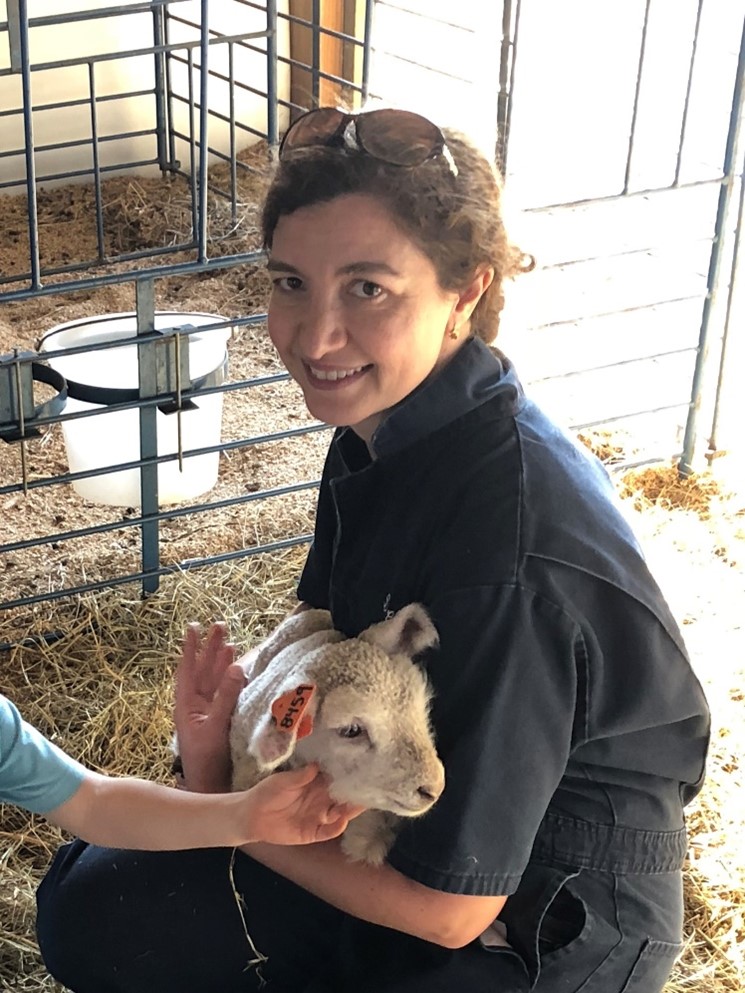Meet Dr. Celina M. Checura
Written by Dr. Angela Gonella (Diversity Committee Chair) in celebration of Hispanic Heritage Month
The National Hispanic Heritage Month is annually celebrated from September 15 to October 15 in the United States to recognize the contributions and influence of Latinx to the history, culture, and achievements of the United States. In celebration of Hispanic Heritage Month, Diversity Committee Chair Dr. Angela Gonella sat down with Dr. Celina M. Checura from Clemson University. Dr. Checura is also a member of the SSR diversity committee, and during our last annual meeting in Ottawa, she was instrumental in all the planning and logistics of the Diversity Lunch.
Dr. Checura’s research interest focused on how the bioenergetic capacity of cells is modified by the prenatal environment, with an emphasis on the role of mitochondria in early development and in developmental programming. At her lab, they use two different models: bovine in vitro fertilization for oocyte and early embryonic development and pregnant sheep for later stages of embryonic and fetal development.

AG. What is your current position, and what does it entail?
CMC. I am a Research Scientist at the Piedmont Research and Education Center at Clemson University. I am also a Faculty Scholar at the Clemson University School of Health Research and an Adjunct Faculty at the Department of Bioengineering. I dedicate most of my time to research in my laboratory and at the farms, working with collaborators across campus and with physicians and researchers from other universities. As an adjunct, I am also involved in some teaching activities with graduate and undergraduate students.
AG. Can you talk a little bit about yourself? Where are you from? What first attracted you to the world of science? And how did you get to be in your current position?
CMC. I am a veterinarian from Córdoba, Argentina. As a first-year veterinary medicine student, I was amazed by the complexity and perfection of the fertilization process and embryo development, and yet the common occurrence of it all. After that, I dedicated my career to reproductive sciences. I discovered a world of research beyond veterinary practice thanks to one of my professors, Dr. Luis Losinno. After graduation, I worked as a private practitioner for a few years at equine embryo transfer centers in Argentina. Then I moved to Colorado for my Master’s in Dr. George Seidel’s lab at CSU. Loving the research path, I went to UW-Madison for my PhD in Endocrinology and Reproductive Physiology in Drs. John J. Parrish and O.J. Ginther’s labs. I took a little detour and became a Diplomate of the American College of Theriogenologists, and then took a clinical assistant professor position at the UW-Madison School of Veterinary Medicine… but the clinics didn’t fulfill my passion for research, so I followed my husband to Clemson University, where I have a research appointment in one of the Research and Education Centers, a small lab, and a big smile.
AG. What are your future career goals?
CMC. I want to expand my laboratory and increase our collaboration network. We would like to continue working on basic science and expand our translational medicine studies to improve the health and well-being of people and animals alike.
AG. Are there ways in which you think your heritage has affected your perspective or career trajectory?
CMC. I think my heritage is reflected in all aspects of my personality, and therefore, it had a strong influence on my career. I am a Latin-American woman, and with that statement, I am already considered a minority. Or, in other words, I am “different” than the majority… while this is challenging, it also gave me the freedom to be myself and not be afraid to take “different” approaches in science and in life.
As a child, I lived in several countries due to my father’s job. Foreigners usually integrate into their adopted societies but also tend to get together with other foreigners as we share many things in common; we are all different but similar at the same time. As young kids, we didn’t necessarily see the differences, and I am thankful for that. I learned that good and bad people come in all colors and religions, and there is no link between those qualities.
Then there was a time when I lived in a small town of less than a thousand people, and I was the different one; the one people would look at as something peculiar, and the kids would laugh because I dressed, spoke, or did, something in a different way. However, instead of anger, that taught me empathy for those who are marginalized and made me realize how most of those reactions are really more tied to ignorance than to bad intentions.
As we grow up, our challenges change. My first big job offer as an equine veterinarian was quickly turned down when the owner of the company knew that Dr. Checura was a woman. Luckily, things are changing, and I had the privilege to be among the first in that wave of progress.
My Latin-American background has taught me that you always must work hard and adapt to the ever-changing circumstances if you want to grow. There will be setbacks, but you need to get up and keep going.
AG. What words of inspiration would you like to share with the future generation of scientists, especially those coming from diverse backgrounds?
CMC. Follow your dream, and don’t get discouraged when things go a different way. Enjoy the ride. You will reach some of your goals, but other goals will change during your journey, and that’s OK. We all change as we grow older. Learn to take on new opportunities and never stop moving forward.

